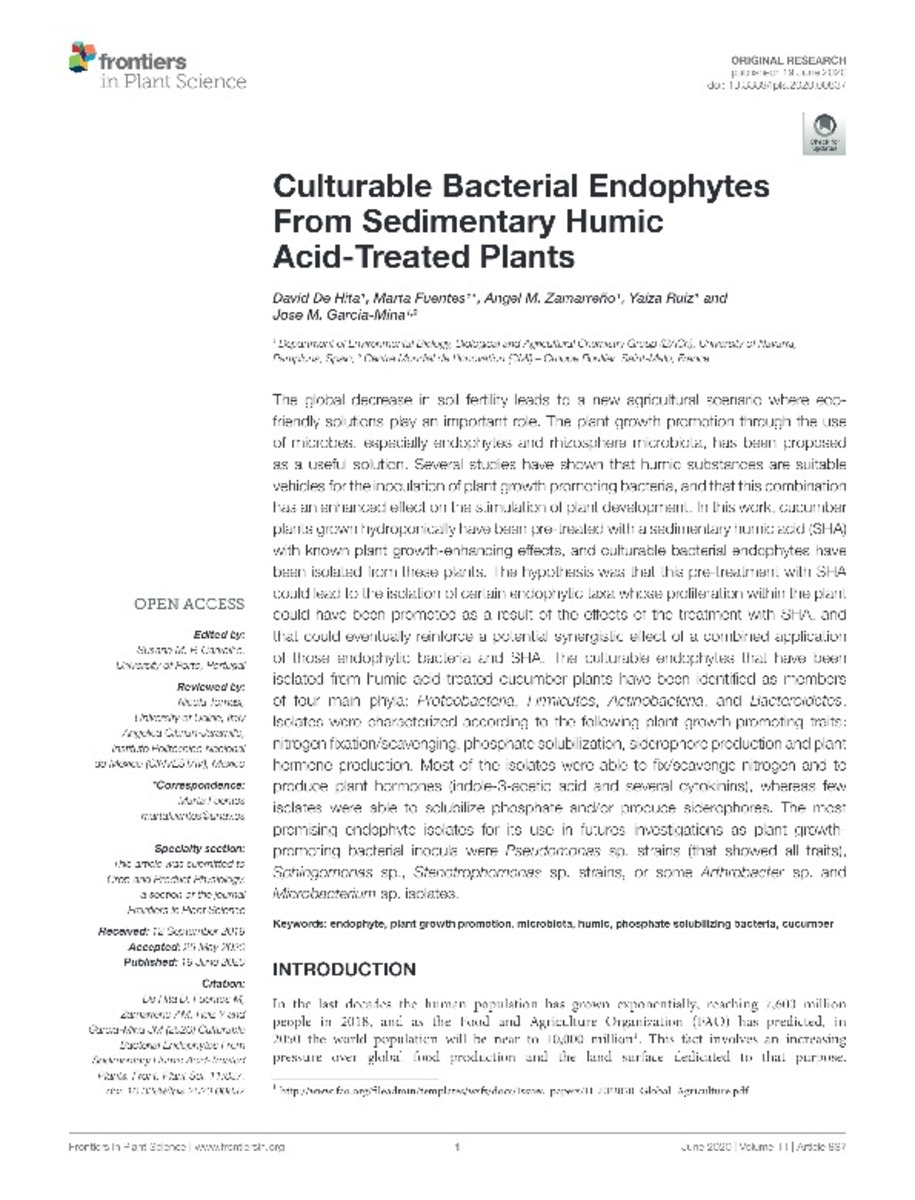Registro completo de metadatos
| Campo DC | Valor | Lengua/Idioma |
|---|---|---|
| dc.creator | Hita-Mejía, D. (David) de | - |
| dc.creator | Fuentes-Ramirez, M. (Marta) | - |
| dc.creator | Zamarreño, A.M. (Angel Maria) | - |
| dc.creator | Ruiz, Y. (Yaiza) | - |
| dc.creator | García-Mina, J.M. (José María) | - |
| dc.date.accessioned | 2020-10-26T11:20:01Z | - |
| dc.date.available | 2020-10-26T11:20:01Z | - |
| dc.date.issued | 2020 | - |
| dc.identifier.citation | Hita-Mejía, D. (David) de | es |
| dc.identifier.issn | 1664-462X | - |
| dc.identifier.uri | https://hdl.handle.net/10171/59574 | - |
| dc.description.abstract | The global decrease in soil fertility leads to a new agricultural scenario where eco-friendly solutions play an important role. The plant growth promotion through the use of microbes, especially endophytes and rhizosphere microbiota, has been proposed as a useful solution. Several studies have shown that humic substances are suitable vehicles for the inoculation of plant growth promoting bacteria, and that this combination has an enhanced effect on the stimulation of plant development. In this work, cucumber plants grown hydroponically have been pre-treated with a sedimentary humic acid (SHA) with known plant growth-enhancing effects, and culturable bacterial endophytes have been isolated from these plants. The hypothesis was that this pre-treatment with SHA could lead to the isolation of certain endophytic taxa whose proliferation within the plant could have been promoted as a result of the effects of the treatment with SHA, and that could eventually reinforce a potential synergistic effect of a combined application of those endophytic bacteria and SHA. The culturable endophytes that have been isolated from humic acid-treated cucumber plants have been identified as members of four main phyla:Proteobacteria,Firmicutes,Actinobacteria, andBacteroidetes. Isolates were characterized according to the following plant growth-promoting traits: nitrogen fixation/scavenging, phosphate solubilization, siderophore production and plant hormone production. Most of the isolates were able to fix/scavenge nitrogen and to produce plant hormones (indole-3-acetic acid and several cytokinins), whereas few isolates were able to solubilize phosphate and/or produce siderophores. The most promising endophyte isolates for its use in futures investigations as plant growth-promoting bacterial inocula werePseudomonassp. strains (that showed all traits),Sphingomonassp.,Stenotrophomonassp. strains, or someArthrobactersp. andMicrobacteriumsp. isolates. | - |
| dc.language.iso | en | - |
| dc.rights | info:eu-repo/semantics/openAccess | - |
| dc.subject | Endophyte | - |
| dc.subject | Plant growth promotion | - |
| dc.subject | Microbiota | - |
| dc.subject | Humic | - |
| dc.subject | Phosphate solubilizing bacteria | - |
| dc.subject | Cucumber | - |
| dc.title | Culturable bacterial endophytes from sedimentary humic acid-treated plants | - |
| dc.type | info:eu-repo/semantics/article | - |
| dc.description.note | CC BY | - |
| dc.identifier.doi | 10.3389/fpls.2020.00837 | - |
| dadun.citation.publicationName | Frontiers in Plant Science | - |
| dadun.citation.startingPage | 837 | - |
| dadun.citation.volume | 11 | - |
Ficheros en este ítem:
Estadísticas e impacto
Los ítems de Dadun están protegidos por copyright, con todos los derechos reservados, a menos que se indique lo contrario.






